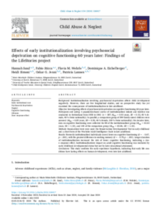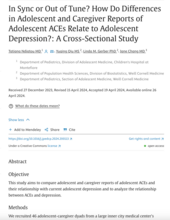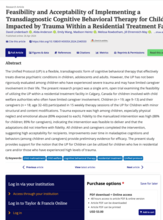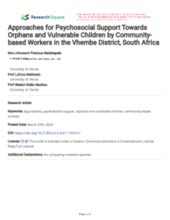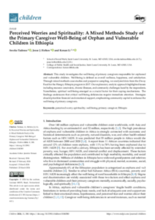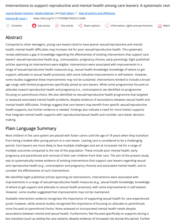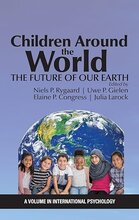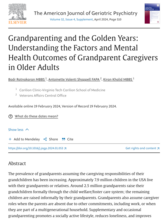Displaying 11 - 20 of 525
This study protocol outlines the first randomized controlled trial of Hope Groups—a 12-session psychosocial, mental health, and parenting support program—among Ukrainians affected by war. The trial aims to assess its impact on caregiver mental health, violence prevention, and family well-being, with potential for global adaptation and scale-up in other crisis-affected settings if proven effective.
The purpose of this longitudinal study conducted on institutionalized infants and toddlers in Switzerland from 1958 to 1961 and then 60 years later on the same group, is to investigate the effects of psychosocial deprivation on cognitive functioning in late adulthood.
The purpose of this U.S.-based study was to compare adolescent and caregiver reports of adolescent adverse childhood experiences (ACEs) and their relationship with current adolescent depression and to analyze the relationship between ACEs and depression.
This research project was an open trial examining the feasibility of utilizing the Unified Protocol (UP) -- a form of cognitive behavioral therapy -- within a residential treatment facility in Calgary, Canada for children involved with child welfare authorities who often have limited caregiver involvement.
In this episode Amanda Griffith of Family for Every Child is joined by representatives of three member organisations who are working to support children's mental health and wellbeing across three continents.
This qualitative exploratory-descriptive study outlines alternative approaches to psychosocial support for Orphans and Vulnerable Children in four municipalities of Vhembe district in Limpopo Province, South Africa, in the form of community-based interventions.
This study investigates the well-being of primary caregivers responsible for orphaned and vulnerable children in Ethiopia. Well-being is defined as overall wellness, happiness, and satisfaction.
This systematic review addresses a gap in knowledge regarding the effectiveness of existing interventions that support care leavers’ sexual/reproductive health (e.g., contraception, pregnancy choices, early parenting). Eight published articles spanning six interventions were eligible.
This book looks at major macro trends affecting children as well as interventions that have been used to address problems that children face. Topics that are addressed include the UN Convention on Children, Non-Governmental Organizations (NGOs) that support children, and development issues like pre and post-natal health, family systems, gender roles, and puberty/adolescent issues. Attention is given to major risk factors and challenges such as sex trafficking, child labor, street children, protecting children in congregate care, and violence against children in the home, in institutions, and in the community.
This report outlines the various trends and reasons for the rise of grandparents involved in caring for grandchildren in the U.S. It also describes the different types of households involving grandparents and grandchildren, including grandfamilies, skipped-generation, and three-generation families, and summarize various theories of grandparent stress including role strain theory and social exchange theory.


